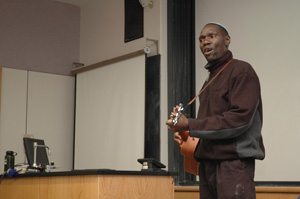J.J. Keki is the founder and director of the Peace Kawomera Cooperative, which exports the coffee beans of more than 550 Ugandan farmers to the Thanksgiving Coffee Company in California. He talked about the fair trade coffee, Mirembe Kawomera, as well as religious intolerance in Uganda on Monday in the Center for Natural Sciences. Staff Writer Aaron Arm spoke with Keki about his company and how it relates to the country’s religious conflict.

Aaron Arm: How does Thanksgiving Coffee help promote peace?
J.J. Keki: The label of each package tells about peace, and it encourages people to buy our coffee so that this coffee can help poor peasants in Uganda … . People can now … take their children to school. The money cannot be enough for other activities, but they can now use the money for school fees.
AA: How does this relate to religious tolerance?
JK: Our [cooperative] was made on religious interfaith, so … you find that people are now changing in the community. If, in religion, everyone can respect one another, we can develop our communities.
AA: How was there religious discrimination in Uganda?
JK: That was in 1971, when Idi Amin came into power. He didn’t want groups like
Judaism or smaller groups of Christianity. They were abolished. There was only Islam, which is one of the major religions, Catholic and Anglican. The neighboring people took over our property because we were not using our land on which our synagogues were built.
AA: Are there any future plans for the Thanksgiving Company or your organization?
JK: We are looking to export mangoes, exporting pineapple, exporting jacafruit [Jackfruit] … avacados, vanilla. We want to set up beehives and hope to export the honey … . We also want to organize a music band, with all religions, so we can produce some CDs to sell. We have already set that group to be called “Mirembe Dramatic.” … We hope to produce our music and sell it.
For more information about Mirembe Kawomera, visit www. mirembekawomera.com.




